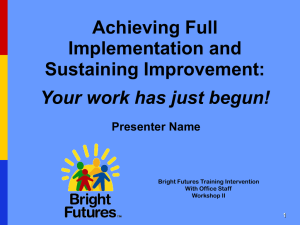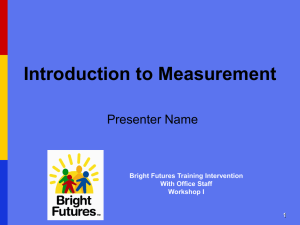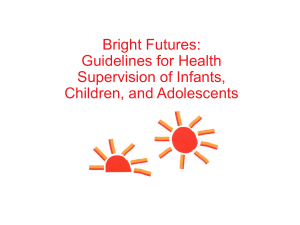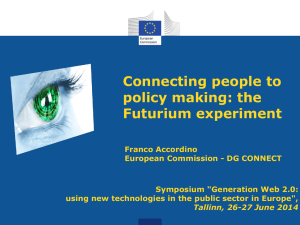+ LCT Key Concept: Environment
advertisement
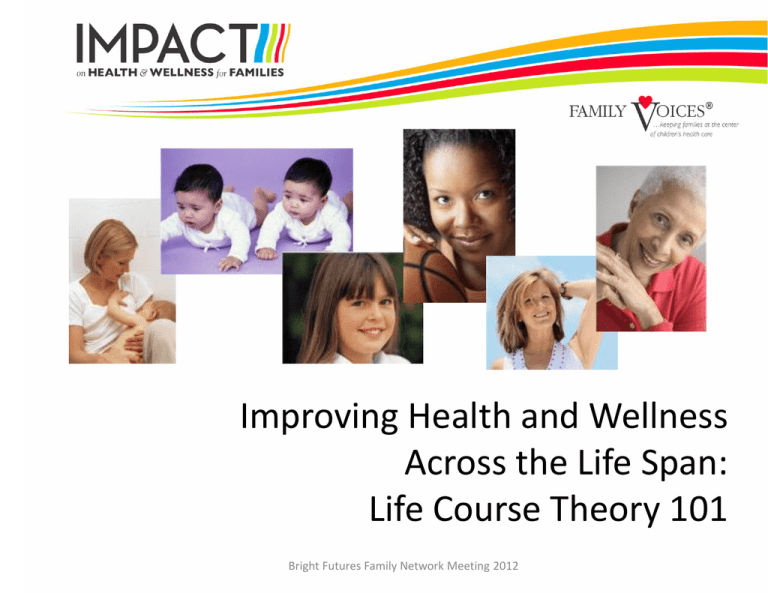
Improving Health and Wellness Across the Life Span: Life Course Theory 101 Bright Futures Family Network Meeting 2012 What is Life Course Theory (LCT)? Bright Futures Family Network Meeting 2012 What is Health, Anyway?? “Health is defined as the extent to which individuals or population groups are able or enabled to a) Develop and realize their potential b) Satisfy their needs c) Develop the capacities that allow them to interact successfully with their biological, physical, and social environments.” --from Fine, A. and Kotelchuck, M. “Rethinking MCH: The Life Course Model as an Organizing Framework Concept Paper,” November, 2010. US Department of Health and Human Services, Health Resources and Services Administration. Bright Futures Family Network Meeting 2012 What is Wellness? “Wellness is considered to be an active process of becoming aware of and learning to make choices (healthy choices) that lead toward a longer and more successful existence. • We use the word ‘process’ to note that further improvement is always possible • We use the word ‘aware’ to note that we are continuously seeking more knowledge about how we can improve. • We use the word ‘choices’ to note that we consider many options and choose those in our best interest.” From: http://wellnessproposals.com/wellness-articles/definition-of-wellness/ Bright Futures Family Network Meeting 2012 LCT is a “conceptual framework”: • LCT looks at populations over time. • LCT identifies multidisciplinary factors that affect health and wellness. Bright Futures Family Network Meeting 2012 Traditional Approach to Improving Health and Wellness: Tackle the various specific diseases and conditions that plague the health of the nation—obesity, heart disease, cancer, etc. Bright Futures Family Network Meeting 2012 DIABETES CANCER HEART DISEASE OBESITY MENTAL ILLNESS Bright Futures Family Network Meeting 2012 LCT Recognizes: • These conditions don’t just appear out of nowhere. • There are environmental, genetic, and community-based factors that can have a profound effect. Bright Futures Family Network Meeting 2012 Life Course is not new to MCH “MCH does not raise children, it raises adults. All of tomorrow's productive, mature citizens are located someplace along the MCH continuum. They are at some point in their creation either being conceived or born or nurtured for the years to come. There is very little genuine perception that mature people come from small beginnings, that they've had a perilous passage every moment of the way. All the population, everybody of every age were all at one time children. And they bring to their maturity and old age the strength and scars of an entire lifetime.” Pauline Stitt, MCHB 1960 Bright Futures Family Network Meeting 2012 LCT seeks to address the answers to two questions: • Why do health disparities persist across population groups, even in instances where there has been significant improvement in incidence, prevalence, and mortality rates for a specific disease or condition across all groups? • What are the factors that influence the capacity of individuals or populations to reach their full potential for health and well-being? Bright Futures Family Network Meeting 2012 LIFE COURSE THEORY IS BUILT ON FOUR KEY CONCEPTS Bright Futures Family Network Meeting 2012 LCT Key Concept: Timeline What happens today influences tomorrow’s health. Bright Futures Family Network Meeting 2012 LCT Key Concept: Timeline • The path to health is built—or diminished over the lifespan. • It’s not a series of discreet steps, but rather an integrated continuum of exposures, experiences, and interactions. Bright Futures Family Network Meeting 2012 LCT Key Concept: Timing There are critical periods, such as fetal development, birth, early childhood, etc., especially important in predicting lifelong health. Bright Futures Family Network Meeting 2012 LCT Key Concept: Timing • Early experiences can “program” an individual’s future health and development. • Start early (prenatally), and include intergenerational programming (health of women prior to conception). • Adverse programming can lead to illness, or more susceptibility to illness. Bright Futures Family Network Meeting 2012 LCT Key Concept: Environment The community environment, including both biological and social elements, significantly impacts health. Bright Futures Family Network Meeting 2012 LCT Key Concept: Environment Protective factors improve health and contribute to healthy development. + Risk factors diminish health and make it more difficult to reach full developmental potential. Bright Futures Family Network Meeting 2012 LCT Key Concept: Environment Risk and protective factors include: • Individual behavioral patterns • Receipt of medical care and social services • Factors related to family, neighborhood, community, and social policy Bright Futures Family Network Meeting 2012 LCT Key Concept: Environment Protective Factors • A nurturing family • A safe neighborhood • Strong and positive relationships • Economic security • Access to quality medical care and other health services • Access to high quality schools and early care Risk Factors • • • • • • • Food insecurity Homelessness Living in poverty Unsafe neighborhoods Domestic violence Environmental pollution Inadequate education opportunities • Being born low birthweight Bright Futures Family Network Meeting 2012 LCT Key Concept: Environment The cumulative effect of multiple stresses over time may have a profound impact on an otherwise positive trajectory. Bright Futures Family Network Meeting 2012 LCT Key Concept: Equity More than just genetics and personal choices causes the inequalities in health. Bright Futures Family Network Meeting 2012 LIFE COURSE THEORY: CRITICISMS Bright Futures Family Network Meeting 2012 LCT: Criticisms • Life Course Theory sounds fatalistic: If I experienced adverse events or experiences early on, I’m doomed. • Life Course Theory can lead to “front loading” of interventions around pregnancy and early childhood, and ignores interventions with other age groups. Bright Futures Family Network Meeting 2012 LCT: Response to Criticisms • Interactive Processes: The development of health over a lifetime is an interactive process, combining genes, environments, and behaviors. • Lifelong development/lifelong intervention: Risk factors can be diminished and protective factors enhanced throughout life and at all stages. Bright Futures Family Network Meeting 2012 Life Course Theory is a Whole-Person, Whole-Family, Whole-Community systems approach to health and wellness. Bright Futures Family Network Meeting 2012 And so is Bright Futures! “… For many children and their families, each new day is an opportunity for further self-realization, enhancement of good health, and promotion of self-esteem. For millions of others, however, the future holds little promise; their health status is poor, their health risks are many, and their prospects for successfully overcoming these problems are limited. These children, and all of our nation’s children, deserve the attention, the encouragement, and the intervention of health professionals from many disciplines to ensure that they develop the healthy bodies, minds, emotions, and attitudes to prepare them to be competent and contributing adults.” –Morris Green, MD, Bright Futures Guidelines, 1994 Bright Futures Family Network Meeting 2012 Bright Futures Is Life Course Theory in Action! TIMELINE/TIMING: Bright Futures is built around anticipatory guidance that helps families look ahead and prepare. ENVIRONMENT: Bright Futures Health Promotion Themes address more than just anatomy and physiology: Family Support Child Development Mental Health Healthy Weight Healthy Nutrition Physical Activity Oral Health Healthy Sexual Development and Sexuality Safety and Injury Prevention Community Relationships and Resources EQUITY: Bright Futures is for all children, and embraces cultural competency as a means of reaching all families. Bright Futures Family Network Meeting 2012 Questions? (c) Family Voices IMPACT 2012
